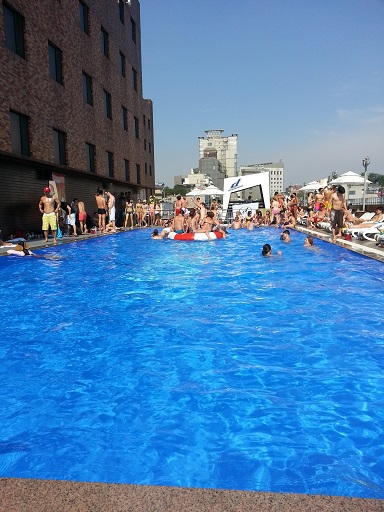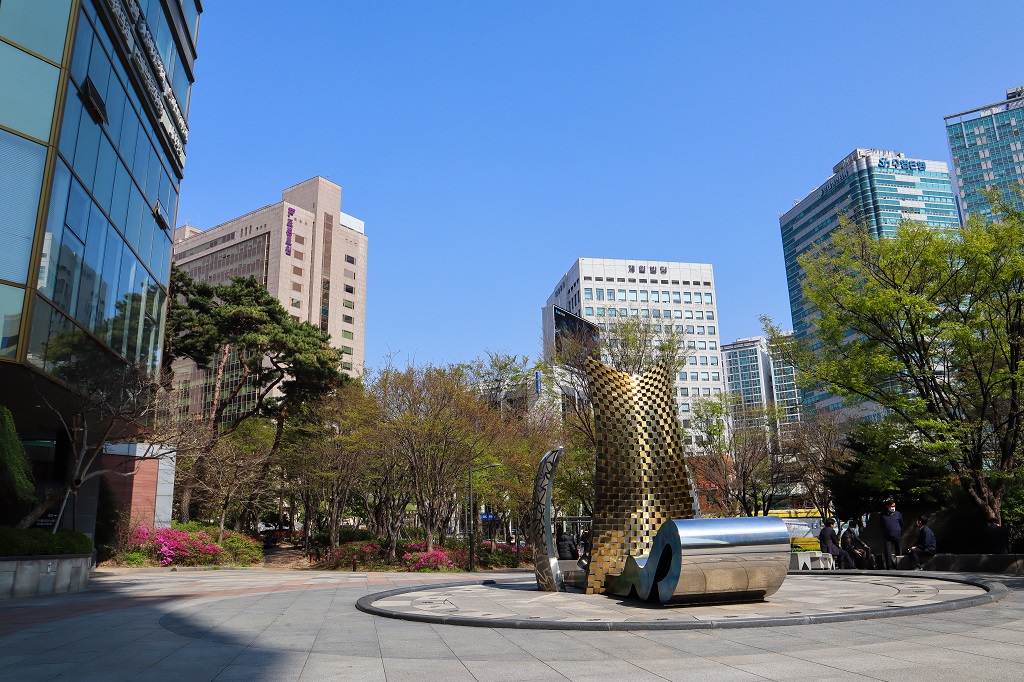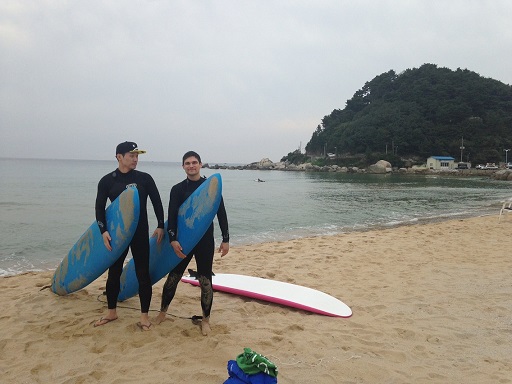
This guide shows you how to teach English in Korea like a seasoned vet.
You’ll learn:
- How to find the right job for you
- Expected starting salary
- What to do before signing a contract
- How to get better teaching jobs
I got my first job in South Korea in 2006 and worked at private academies, public schools, universities and education companies. Here’s what I learned from my experiences.
Essential Tips
- Check a school’s reputation online before working there.
- Get a copy of your employment contract in Korean and English, and check for penalty clauses.
- Have them put EVERYTHING in writing.
- Ask to see your housing before signing.
How to get your first English teaching job in South Korea
Step 1. Have the right qualifications
To teach English in Korea without being overseas Korean or married to a local will require an E-2 visa, you’ll need:
- Passport from U.S.A., Canada, UK, Ireland, Australia, New Zealand or South Africa
- Bachelor’s Degree in any field
- Clean criminal record
- Health screening (pass drug and HIV test in Korea)
Step 2. Find the right job online
Decide where you want to teach English (private academy or public school) and in which city.
Check the school’s reputation online. You can search for “blacklisted English academies” and the name of the hagwon.
Step 3. Apply
Send all required documents including:
- Resume
- Picture
Be prepared to do a phone or video interview.
If you get the job, ask to see pictures of your housing and follow our checklist below.
Step 4. Get packed
Make sure to bring:
- Warm winter clothes
- Cool summer clothes
- Business casual clothes for teaching (depending on your school)
- Prescription medication in bulk
- Vitamins and pain relievers in bulk
- Melanin for light sleepers
- Unlocked phone (if you don’t want to buy a new one)
- Your favorite spices
- Power converter if you’re not coming from the EU (they use 220 volt plug C and F)
More about Moving to Korea and What to Pack

English Teacher salaries in Korea
The starting monthly salary for someone with a bachelor’s degree from an English-speaking country is 2.1 million KRW or 1,800 USD. After taxes, which are 2.5 to 5%, you take home about $1,700.
That’s not all, you also get free housing, flights, pension, insurance and a bonus of one month’s salary each year! There’s optional overtime hours over 120 hours each month and private tutoring that’s a lucrative (you can make 50 dollars an hour), yet legal gray area you need to be careful with (more on this later).
Most places offer 10% raises a year up to 2.8 million Korean Won (2,400 dollars in freedom money). You can live comfortably while saving money for things like student loan payments and travel.
Why else you should teach English in Korea
Work

- Teaching English opens up opportunities you wouldn’t find at home.
- You get paid to meet interesting people and learn about another culture.
- Teachers are well-respected in Korea. Students in their 40s and 50s treated me well, even when I was in my early 20s. There’s even a Teacher’s Day!
- You can have a high-standard of living in South Korea. The base salary is around 2 million KRW ($1,800) a month and housing is provided, enough to live comfortably and enjoy a variety of activities.
- You can even save money and spend it on travel between contracts or pay off student loans.
- Korea has an affordable healthcare system that costs about 100 USD a month.
- You and your employer contribute to a pension plan every month that you can cash out when you leave.
- You get paid one month’s salary for every year you work. This is known as 퇴직금 or severance pay. Plus 10% raise on average.
- Most jobs pay for your flight into the country and flight home after a year.
Play

- Locals like to say, “America is a boring heaven and Korea is a fun hell”. The good news is, you’ll get more of the fun part.
- You can find activities you enjoy back home like shopping, snowboarding, surfing, salsa dancing, camping, hiking, wake boarding, fishing and cycling.
- Brunch and coffee culture in Seoul is top-notch.
- Seoul has enough neighborhoods with bars, clubs and restaurants to keep you busy for years.
- Korea is a great place to be single.
- Crime rate is very low, even in a huge city like Seoul. You can leave all your stuff in public and no one will touch it (except bicycles).
- Korea has amazing online shopping and service.
- Seoul has expats from all over the world. I made friends from all over including Argentina, Nigeria and Uzbekistan.
- Korea has a network of buses and modern subways that can be accessed with one transportation card (T-money).
- Transportation budget can be $50-100 dollars a month, since a round trip on public transport costs about 2 dollars.
- The only place you’ll need a car is Jeju.
Why You Shouldn’t Teach English in Korea


Average traffic in Seoul
Work
- Teaching English is draining for introverts, especially if your curriculum isn’t organized (I’m pretty introverted myself, so I needed time to recharge between lessons).
- The work environment is generally high-paced and demanding.
- Looks and relationships can be more important that merit and results (this is changing slowly).
- Traffic is serious during commuting times in Seoul and even Busan. It’s often quicker to take the subway (make sure to check how far your place is from work).
Play
- Not a good place for inflexible or sensitive people (laughing things off helps).
- Things are getting more expensive, especially in Seoul.
- Air quality is hit or miss.
- You might feel like an outsider.

Where can I find teaching jobs in Korea online?
English teaching jobs
These sites offer a mix of all types of English teaching jobs with a focus on hagwon or private institutes.
Korvia – A newer job board that specializes in Korea and China.
Dave’s ESL Cafe – An old standby that mainly lists ESL jobs. The forums also contain great info on living in Korea (just don’t get sucked into the negativity).
Englishspectrum – This site specializes in jobs for English speakers in Korea. In addition to English teacher positions, there are also jobs in hostels where accommodation is included.
Worknplay – A very active site with tons of English teaching jobs.
Eslrok – Has more than just job listings, they help you build a resume and get hired.
Teachaway – They offer science and math teaching jobs in addition to English ones.
Craigslist – There are many English teacher and server positions of varying quality.
Public School Jobs
These programs specialize in getting you public school jobs.
EPIK – A popular government program you can teach English through
Seoul Metropolitan Office of Education (SMOE) – Similar to Epik, but with a focus on Seoul. It merged with EPIK and is now known as EPIK-Seoul
Gyeonggi English Program (GEPIK) – A program that assigned teachers to Gyeonggi-do that was absorbed by EPIK. You can apply for jobs in Bucheon, Bundang, Suwon, Yongin and Gimpo through EPIK now. Just check the box for Gyeonggi-do on the application.
Teach & Learn in Korea Program (TaLK) – A program for university students with two years of study who want to spend their gap year teaching English and learning about Korea
University Jobs
Higher Ed Jobs – The place for post doctorate graduates who want to find lecture and research opportunities.
Private Academies (Hagwon) VS Public Schools
Here are some general differences between the two. There are exceptions, so shop around.
Private Academies
Students: children and/or adults
Salary: 2 to 2.5 million KRW a month for 30 teaching hours a week
Housing or housing allowance: around 400,000-500,000 KRW per month
Training: a few days of shadowing another teacher
Focus: maximizing student numbers and re-enrollment
Schedule: varies
Class size: from 1-30 students
Vacation: 10 days a year
Flight ticket: to and from Korea (if you’re already in the country, many places offer a one-way ticket.)
Overtime pay: 1.5 pay per hour above contracted work hours
Severance pay: 1 month’s salary for every 12 months teaching
Parent interaction: high
Raises: 10% a year on average
Public Schools
Students: children only
Salary: 1.8 to 2.2 million KRW a month for 22 hours a week
Housing or housing allowance: around 400,000-500,000 KRW per month
Training: one week training program
Focus: education and test scores
Schedule: regular
Class size: 20-30 students
Vacation: one to two months a year
Flight ticket: to and from Korea (if you’re already in the country, many places offer a one-way ticket.)
Overtime pay: 1.5 pay per hour above contracted work hours
Severance pay: 1 month’s salary for every 12 months teaching
Parent interaction: low to none
Raises: 10% a year on average
Where can I find better teaching jobs once I’m in Korea?
The best jobs aren’t advertised. Being in the country opens up tons of opportunities if you put yourself out there. Many companies need English speakers to teach the language and perform tasks like writing emails, translation and marketing.
- Get out of your comfort zone and participate in activities you’ve never tried.
- Teach adults to network better.
- Learn Korean and search local job boards.
- Ask a Korean friend to help.
Where should I teach in Korea?

It really boils down to your preferences.
- If you want more money, private academies pay a bit more than public schools on average.
- If you prefer more time off, public schools offer longer breaks.
- If you want to teach adults, some private academies specialize in adult education.
- If you want a more structured environment, public schools tend to be more organized.
- If you feel lucky, private academies are more hit and miss.
Where shouldn’t I teach in Korea?
These are more of a suggestion than hard and fast rules. Korea changes all the time and what was once bad can become great overnight.
- English camps often don’t provide good working environments for whatever reason. Proceed with caution if you get an offer.
- Shady hagwons. Check for addresses not matching or lack of curriculum/training. Also, check hagwonblacklistkorea subreddit, waygook.org and eslcafe.com for negative feedback.
At which city should I teach in Korea?
It really depends on what you’re looking for.
More about where to live in Korea
You can live anywhere in the country, even on the border of North Korea (you’ll be safe, probably). Here are the more popular cities for expats:
Seoul (서울)
Perfect for young, single extroverts who have a lot of energy.
Pros
- It has it all, jobs, activities and culture
- Unlimited choices for nightlife
- The most attractive and well-dressed people in one place
Cons
- Can be crowded, noisy and polluted
- Cold winters and hot summers
- Becoming more expensive each year
Notable neighborhoods
Shinchon/Ehwa/Hongdae (신촌/이화/홍대): Younger college towns that are right next to each other.
Itaewon/Gyeongildan/Haebangchon (이태원/경리단/해방촌): The foreign districts with plenty of international food options and a small, tight knit community of expats.
Daeghak-ro (대학로): It’s not so central but it’s a great place for art lovers in their late 20s to 30s.
Yeouido (여의도): Perfect for those who want to network with locals and teach adults.
Gangnam/Apgujeong/Shinsa (강남/압구정/신사): It’s a great place to get some high-paying private lessons on the side.
Jamsil (잠실): Lots of stadiums, green spaces and amusement parks. It’s the place in Seoul for those who come with a family.
Gyeonggi (경기도)
It’s a suburb containing “bed towns” where people working in Seoul go to sleep. A good place for people with families.
Pros
- Less crowded and expensive than Seoul
- More green spaces and parks
- There are still many trendy neighborhoods with nice cafes and restaurants
Cons
- People in Gyeonggi say that everything is one and a half hours away, since they tend to travel to Seoul for work
- Some areas have a small-town mentality/xenophobia plus the stress of working in Seoul
Busan (부산)
Perfect for people who want a big city, but with warmer weather and beaches!
Pros
- Warmer and milder weather
- More affordable living costs including “people’s food” options
- They have events rivaling those in the capital including a large international film festival (BIFF) every year
Cons
- Traffic is still a problem because streets are narrow
- Gets super touristy in the summer
Changwon (창원)
A city that’s big on education and great infrastructure with the same layout as Canberra, Australia.
Pros
- Higher pay
- Better weather than Seoul
- Cleaner air
- Tons of opportunities for private lessons
Cons
- Far away from attractions
- Not the most exciting place to live
What to check before signing a contract to teach English
Don’t be pressured into signing the first contract you get. There are literally hundreds of recruiters and places to teach in Korea.
- Who you’ll be teaching (kids or adults or both).
- How far your place of employment is from home (closer is better to avoid traffic).
- Your future house and neighborhood are livable (look out for bars, clubs or other signs of a seedy neighborhood).
- Penalty clause in the contract like deducting plane ticket costs if you resign early (technically illegal, so ask them to remove any).
- How many teaching hours are in your contract (should be around 30 a week)
- How a teaching hour is calculated (some places will say it’s less than 60 minutes to get you to teach more classes)
- What kind of training you’ll receive.
- What your overtime pay is (should be time and a half)
- If there are any vague duties that will amount to free labor like field trips or mandatory meetings on the weekend
- Pension, insurance and taxes are calculated properly
- If you have to make your own curriculum (reputable places will have their own)
- What people say about your place of employment online (one negative comment isn’t a deal-breaker if everything else looks good)
How to ask for a higher starting teacher’s salary in Korea?
Always ask for the higher end of the salary range and give a reason why. They might be desperate for teachers and have the budget. Here are some ideas:
- you went to a good school
- you majored in education
- you have experience teaching/working with children
- you love kids
- you understand Korean culture
How to make more money teaching in Korea?
Work overtime. You should get time and half for every hour over 120 you work a month.
Stick around. There should be an automatic 10% raise every year if you renew your contract.
Get an F visa. If you love working in Korea and plan on doing so for the foreseeable future, switch to an F visa. You’ll be able to teach private lessons easily and start a business.
Get a university job. They pay more with fewer work hours.
Pick up some privates. Might get you in trouble, but not if you get permission from your boss. Otherwise, just be discreet.
How do I save money while teaching in Korea?
Eat at work. Some places will offer lunch to employees. Eat it!
More about Korean lunch boxes
Leave Seoul. This one works for both income and savings. Not only do they pay more to attract teachers, things are cheaper by 30% in smaller cities.
Meal prep the Korean way. Make a huge pot of rice and buy/make banchan.
Get a bus/subway card. The good news is it’s the same card that works nationwide. You get a discounted fare this way. It works for taxis too!
Make coffee at home. Get a French Press or Aeropress to save tons of money.
Point cards. I don’t know how they work, but they do. Sign up for them and collect points towards things like free drinks and movie tickets.
Pregame. Have a few drinks at home before going out.
Which visa do I need to teach in Korea?
There are two types of visas that allow you to teach English, “sponsored” or “non-sponsored”. Visa rules change every year, so check this website to find the latest requirements.
Here’s a list of the most common work visas.
E Visas (Sponsored)
All E visas are sponsored by The Korean Department of Immigration and the Korean Department of Consular Affairs (Korean Consulates).
You need to register at a local immigration office if you plan to stay in Korea longer than three months. There’s a penalty if you don’t. Your employer will help you with this.
Expats can register with an application, and once they’re approved, their passport is stamped and an ARC (Alien Registration Card) is issued.
It can take up to three to four days to receive your ARC. The card allows you to do fun stuff like apply for a driver’s license and open a bank account. You’re required to carry it at all times while in South Korea, although I’ve only been asked to show mine when I entered a bar or club.
If your ARC is lost, damaged or stolen, you need to re-apply for a new one at your local immigration office within two weeks.
You’ll also need to change your visa if you switch jobs, since employers sponsor them. It’s possible to do so without leaving the country, if you have right documents.
Your current employer needs to sign a letter of release, which can be submitted to the immigration office, along with your passport and ARC.
Employers don’t often hand out release letters, so try to have a good relationship with yours in the event that you need one.
E-2 Foreign Language Instructor Visa (Sponsored)
This is one of the most popular visas in Korea for English speakers. It’s also one of the easiest to get since you only need a Bachelor’s degree, criminal background check and a school/hagwon willing to sponsor you.
It allows you to teach languages at private academies, public schools and other similar institutions. This multiple-entry visa is granted for 13 months and can be renewed in one-year intervals.
Check out potential schools thoroughly online before signing a contract for an E-2 visa.
E-1 Professor Visa (Sponsored)
This visa is for expats who want to lecture or conduct research in their field at universities. It’s a multi-entry visa that’s valid for one year.
F Visas (Non-sponsored Visas)
These are the best Visas if you plan on working long-term in Korea. I highly recommend getting one if you want the freedom to choose your employer and resign without a signed release letter.
I was fortunate enough to get one after a few months. Having an F visa made my experience a lot better, since I could work anywhere legally. But, if you find a great school, it won’t matter.
F-4 Overseas Korean Visa (Non-sponsored)
The perfect visa for those lucky enough to be born Korean in another country. It allows you to work anywhere in the country without a sponsor. It’s good for 3 years and is multi-entry. You just have to prove that you’re Korean by showing your birth certificate, family tree and a few other documents.
F-5 Permanent Resident Visa (Non-sponsored)
This is the best visa for foreigners who want to stay in Korea without getting married. It’s approved based on a point system that includes:
- language ability
- special skills
- salary
- savings
- time spent in the country
F-6 Marriage Visa (Non-sponsored)
A great way to stay in Korea indefinitely. The only catch is you have to marry someone from there. Like the F-4 visa, it allows you to work freely anywhere in the country.
When should I apply for an English teaching job in Korea?

You can apply anytime, because hagwons and schools hire year-round. Here are the better times to apply for:
Teaching jobs at public schools
Many public schools hire in February and March, or in August and September, when semesters begin.
Teaching jobs at private academies
Hagwons are always looking for instructors because of their high turnover rate. Some teachers leave after a year resulting in vacancies.
Teaching positions at universities
Most universities hold job fairs in September and October.
What are the different types of English teaching jobs in Korea?
English teacher at a private academy (학원 or hagwon) is the most popular job for non-Koreans. All you need is a Bachelor’s Degree and a criminal background check.
There’s a strong love/hate relationship with this kind of job in the expat community.
Pros:
- They’re easy to get
- There are plenty of them
- They pay well enough
Cons:
- They can be stressful
- They might be dead end since there’s not many future prospects besides managing other teachers
- They give a lot of power to the owner (원장, wonjang). This is because your visa is sponsored by them, and you’re unable to change jobs mid-contract unless they sign your release letter (some immigration officers will overlook you not having one). It’s still unclear whether they’re required to sign a letter of release or not.
***Update 2023***
If you want to change jobs without a letter of release, you can leave South Korea and reapply immediately overseas. It’s unclear when this changed or if this was always the case. It helps to check since Korean immigration laws are unclear and can differ by agent.
***
After-school programs
There are after school programs that run from 1 p.m. to 6 p.m. These are sponsored by the government and generally have better working conditions than hagwons. Network to find these jobs.
Phone English
You can also teach phone English now. The pay ranges from $10 to $40 per hour depending on whether you’re willing to do video calls and your level of experience. The best part is you can work in your pajama bottoms.
University jobs
The Holy Grail of teaching jobs in Korea. It has the lowest number of teaching hours per week and the highest number of vacation days, up to four months. In most cases, you don’t actually need a Master’s or Ph. D, although it can help.
How do I get a university job in Korea?
Uni jobs are very competitive. In Korea, having a good relationship can sometimes be more important than your qualifications. The best way to get one of these is to network and have a good reputation.
I recommend socializing in the right circles. Try classes for hobbies such as cooking, public speaking, dancing, and book clubs. InterNations also holds regular events where you can meet professionals.

Essential Teaching Tips

- Nearly every student you have in Korea will be tired/overworked whether they’re a kid or an adult. Keep things light and fun for the best results.
- In an average classroom in any country, there will be one spectacular student, one troublemaker and the rest will be in the middle. Give everyone equal attention. You’ll be surprised sometimes at who belongs in each category.
- Most unruly kids have poor home environments. Be patient and kind, because it’s usually not your fault if they misbehave.
- Identify the troublemaker and make him/her feel special. You can let them wear your hat or scarf. They usually get on your side quick and help manage the class.
- Be realistic when teaching young children. Focus on one or two main things per lesson you want to teach and make the lesson fun. Having them enjoy English will help them learn in the long-run.
- Sadly, very few people will improve their language abilities over time, so avoid internalizing. Do your best and don’t lose sleep over it.
- You’re the boss in the classroom, even if your students are your parents’ age. You decide the curriculum and when the class ends. That being said, know when to be lenient if the mood is bad.
- Koreans avoid making mistakes in public, which is counterproductive to learning a language. Create a safe and nurturing environment for the best results.
- If someone is shy and hesitates to answer, give them a pass until they’re comfortable.
- You’ll often hear that students think their English is bad or getting worse. This is simply a cultural thing where people downplay their abilities. Don’t take it personally.
- Koreans don’t use the Socratic method and are unfamiliar with discussion in class. It’s very much a “lecture/take notes/memorize to get the test questions right to advance in life” type of environment. Find a happy medium between that and your method.
General requirements to teach English in South Korea
University degree
Having a bachelor’s degree isn’t necessary, but it’s a good idea.
Clean criminal record
Most companies require an apostilled criminal background check from your local intelligence agency. Here are some of the organizations that provide them based on your citizenship.
- US citizens: FBI
- Canadian citizens: RCMP
- Irish citizens: Ireland’s National Police Service
- Australian citizens: Australian Federal Police
- New Zealand citizens: Ministry of Justice
- UK citizens: Disclosure Scotland
- South African citizens: SAPC
Health screening
Like registering at your local immigration office, this must be completed within 3 months of arriving in Korea. It covers 21 items including interview, chest radiography examination, blood test, and urinalysis. Tests must be completed at government-approved hospitals. You can ask your employer or handler for help finding one.
Cannabis is very illegal, so make sure it doesn’t show up on your test (you’ll be sent home). Also, pain pills are known to register false positives, so try to avoid taking anything the week of the test.
A positive drug test terminates your employment contract.
For the medical exam you’ll need:
- 2-5 passport-sized photos
- A valid Passport
- 70,000~130,000 KRW (1,000 – 5,000 KRW for additional copies of check-up results)
- To fast for at least 8 hours before the tests
- An appointment depending on the hospital
Things that will help you get a teaching job in South Korea
These aren’t mandatory, but will increase your chances of finding work in Korea.
Professional look
Appearances are very important in Korea. Try to present yourself well. Dressing for success and proper grooming will make your job search a lot easier.
Also, a professional profile picture helps since Korean job applications require one (most Koreans take one at a professional photo studio while wearing a suit and have it Photoshopped).
Korean language ability
For English teaching jobs, you don’t need to speak a word of Korean.
I could barely read and say hello when I first arrived in Korea.
It may be hard to get motivated in your home country so try joining a language study group or enjoying Korean media.
How to find private lessons in Korea?
Private lessons are the forbidden fruit that’s oh-so delicious, yet oh-so risky. You’re not technically supposed to do them while on an E-2 visa, but they sometimes land in your lap. Best of all, you can charge a minimum of 50,000 KRW an hour in Seoul.
Here are some ways you can increase your chances of finding them in order of least to most risky. For academic purposes only.
- Dress and groom well when you’re in public
- Make business cards
- Go to language exchanges
- Go to networking events
- Go to places where parents congregate
- Go to the right neighborhoods (Gangnam, Mokdong, etc.)
- Advertise on neighborhood internet cafes (Naver and Daum)
What it’s like to teach in South Korea

I got my first job in Yeouido teaching adults. I made the rookie mistake of not vetting the academy before (check blacklists online for your hagwon) and shopping around (get a few offers before deciding).
I ended up teaching the next morning after flying from the states with no training (ask what kind of training you’ll receive).
The students were great. I met people from all backgrounds and made lasting friends, but the management was struggling to keep things together (ask what their teaching philosophy is during the interview).
I taught 30 hours a week with some overtime. The schedule was split from 6:30-8:30am, 12-1pm and 6:30-8:30pm with some afternoon sessions sprinkled in (they gave me some kid classes to fill up my hours).
Teaching takes a lot of energy, especially if you have to make up your curriculum on the fly (ask to see your curriculum before signing the contract), so 30 hours is a full week. But, I was in my 20s so I could manage.
I networked until I was able to get an F visa and a place to stay. After that, I picked up enough private lessons and part-time gigs to match my previous salary while working half the hours.
I worked at a church kindergarten, financial education company, stewardess academy, university, government office and public school. I even taught English to some celebrities and CEOs.
More about Living in Korea as an Expat
I learned a lot about people by gaining access to groups that would be impossible back home. Expats also come from all over the world, so I found out more about places I wanted to visit.
These experiences enriched my life in unexpected ways. I also became fluent in Korean, traveled all over Asia and started this blog.
Teaching in Korea is great for recent college grads and anyone tired of corporate gigs.
FAQ
How many expats teach English in Korea?
At least 24,000 English teachers live and work in South Korea.
How much is the average salary for English teachers in Korea?
The average English teacher salary at a private institute is 2 million KRW ($1,800) a month plus housing, flights in and out, pension, annual bonus and insurance.
How much can I save while teaching English in Korea?
If you’re super frugal, you can easily put away $1,000 a month. This would require some cuts like eating mostly Korean food and drinking soju. A big bag of rice plus some banchan will run you 100 dollars a week and keep you well fed. Public transport is cheap and easy-to-use. Same goes for medical care. Doing this will save you $12,000 a year plus the annual bonus of one month’s salary.
If you want to go out and enjoy life, you can still save $500 a month comfortably with just your base salary. That’s $6,000 a year plus the bonus. Not too shabby. You’d be able to visit palaces, museums and other tourist sites on the weekends.
Do I have to teach children in Korea?
No! But it’s not that bad if you end up doing it. 🙂 Kids are lots of fun in Korea and have a unique sense of humor that might surprise you.
If you’re absolutely against it, check out adult education academies and government jobs. I started my first job at an adult academy, but ended up with some kid’s classes (it happens in Korea). You should specify that you don’t want to teach kids during the interview process.
Can I teach English for six months in Korea?
Yes, if you break your one-year contract. There’s no six-month contract as far as I know.
Private English academies and public schools want you to stay for at least one year given how complex visa sponsorship is and the high cost of flying you there. You also won’t earn enough to afford traveling after six months, unless you really save hard.
What are the entry rules for E2 visas in Korea?
E-visa holders can choose from single-entry, double-entry and multiple-entry visas in South Korea. Make sure to tell the consulate or embassy, or your employer which one you prefer.
Do I need to speak Korean to teach in Korea?
No, but it can help you assimilate and get better jobs.
You won’t need to speak Korean to teach English at a private academy. In fact, it’s often discouraged since students are there to converse with native English speakers.
More about Korean Language
It’s extremely helpful to be able to read and converse at a basic level if you plan to stay for a long period of time. I was able to get some of my best jobs by speaking Korean.
Can people from non-English speaking countries teach English in Korea?
Yes, but not on an E-2 visa. I’ve met people from Russia, the Philippines and India with either an F-6 or F-5 visa who teach English.
Should I use a recruiter to get an English teaching job in Korea?
Recruiters can be helpful, but you definitely don’t need one.
I came to Korea with a recruiter and there were some pros and cons. They had adult education positions, but you can find those jobs without a recruiter. I didn’t pay extra for his services, since the hagwon did (never pay for a job!).
He tried to serve as an intermediary when there was a conflict, but didn’t solve anything. He mostly took the side of the academy and just downplayed any issues like it was normal. At the end of the day, they’re looking for warm bodies to fill positions for a year.
It would be better to work at a place with a recruitment department in-house. That usually means they have some level of success and organization. You can luck out at a small hagwon with a friendly, close-knit work environment, but I feel this is rare.
Did we miss anything?
Teaching English in Korea is a life-changing experience.
Let us know your questions in the comments!




Thank you so much for writing such informative content.
You’re welcome! Thanks for reading!
I have always been fascinated by Korea and its culture, and I think it be an amazing experience to teach English there.
Hi Ian, thanks for commenting. Yes, you totally should give it a shot. Let me know if you have any questions about the process.
Pls I have a question. Can I apply for teaching as a Nigerian and also can I study while working as a teacher. For example I have my bachelors but I want to do my masters and be an English teacher too. Is it possible
Hi Deborah,
Yes, you can with a D-2 student visa and a work permit from the Ministry of Justice. Best of luck!
Excellent information & presented very clearly. I’ve worked in Korea before on an E-2 Visa but do you have any more tips on how to get an F-5 quicker? I assume it’s almost impossible from outside Korea. I worked in Seoul & Suwon before but I’d like to try working in Busan as the weather is better & I like the city. Thanks for any info, it’s greatly appreciated.
Hi Darren,
Thanks!
Yeah, that’s a tough one. Having things like a high KIIP score, doctorate degree and high salary/investment could speed things up. There’s more info on the point system here (https://www.visaskorea.com/f-5-11-permanent-residency-visa/).
Yes, Busan is a nice place to live for a few years. The expat community is smaller of course, but you can check out some cool places in the area like Haedong Yonggungsa.
Thanks for responding with the advice. Cheers!
For sure, I hope it works out!